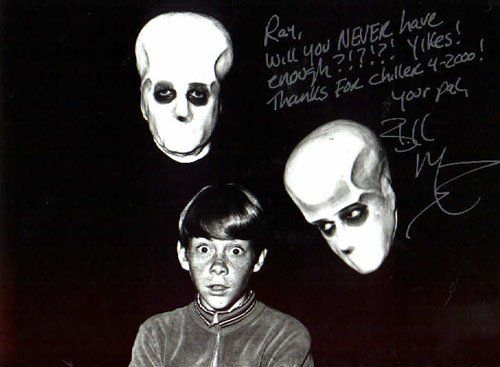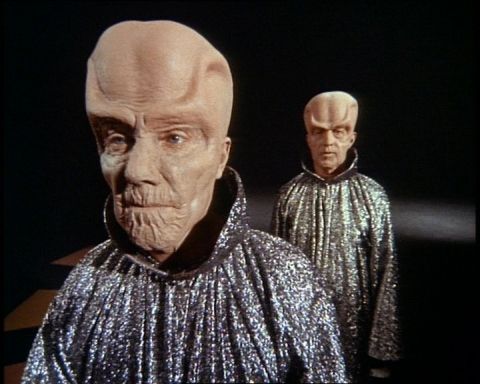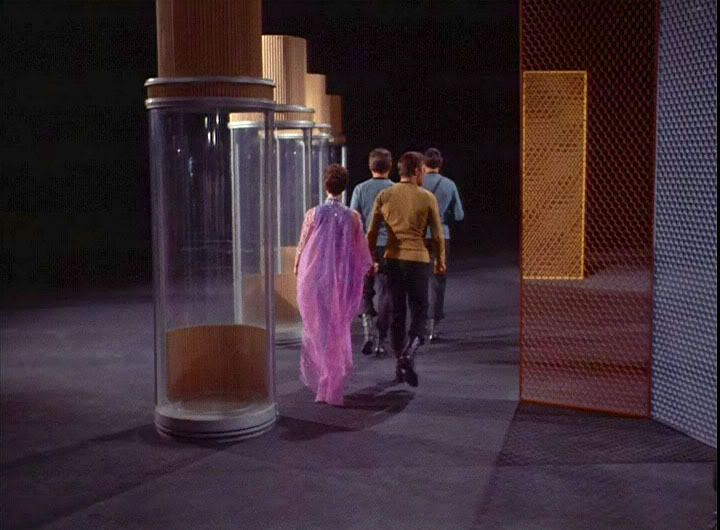A lot of what you said makes sense, but I still think shows can influence each other when fresh ideas are getting scarce. Some of the intersection points bewteen ST and LIS seem more than coincidental, and neither show was above borrowing from FORBIDDEN PLANET.
You just explained it. Every creative work draws on earlier influences. So when two roughly contemporary works seem similar in certain ways, it's probably because they're both drawing on the same pre-existing pool of cultural influences, not because they're directly imitating each other. Like I said, writers try very hard to distinguish their work from the direct competition, because that betters their chances of selling it. But they and their competitors are still part of the same culture, still influenced by the same history and tradition, so some parallels are inevitable.
Consider those photos you posted of the LIS aliens (which I believe were originally made for the final scene of the unaired pilot and then repurposed later in the season) and the Vians in "The Empath." The similarities in shape are clear, but they both strike me as being exaggerations of the contours of the supraorbital ridges and temporal lines of the human skull. The skull is an image that's been part of human culture forever -- it's probably one of the most ancient bits of iconography there is -- so it's natural that many different artists would be influenced by it. So it's not at all unlikely that the LiS and ST makeup creators would've independently designed similar makeups, because they were both drawing on the same source, the human skull.
As for "The Cage" and "The Keeper," alien-zoo stories existed well before either episode; examples include Robert Silverberg's 1956 story "Collecting Team," the 1957 story "The Cage" (yes!) by A. Bertram Chandler, the 1960
Twilight Zone episode "People Are Alike All Over," and the original
Planet of the Apes novel from 1963. Given how long humans have been keeping animals in zoos, the question "what if someone turned the tables?" is an obvious one as soon as you contemplate the idea of aliens more advanced than us. It's also just a slight variation on the standard "heroes captured and imprisoned" trope that drives countless works of fiction. Again, the concept is so elementary and ubiquitous that it doesn't even remotely suggest deliberate imitation.
And there's a major exception to your overall rule: when a show is a big hit, a knockoff will come along on a rival network. MR. TERRIFIC (CBS) was a swing at BATMAN (ABC). I DREAM OF JEANNIE (NBC) was a knockoff of BEWITCHED (ABC). MOONLIGHTING (ABC) was an energetic re-imagining of REMINGTON STEELE (NBC). DYNASTY (ABC) was green-lighted after the huge success of DALLAS (CBS). Hollywood doesn't have as much shame as you give them credit for.
Of course I'm well aware of that, but my point is that just because it
sometimes happens, that doesn't mean it
always does. As I said, accidental similarities between different stories happen
all the time. It is a constant, routine part of any writer's experience. I once mailed in a spec script to ST:TNG and a similar episode aired ten days later, before they even would've had a chance to read my script. And that was on my first try. It's that common. It's hard for a writer to come up with an idea that
isn't similar to a competing story, because there are only so many ways to put the pieces together.
So statistically speaking, when you see a similarity between two contemporary stories, the odds are overwhelmingly in favor of it being accidental. Yes, sometimes it will be deliberate, but most of the time it won't be. So it's safest to assume the resemblance is coincidental, or due to being independently influenced by the same earlier source, unless there's compelling evidence to suggest otherwise.
"Laypeople". --
Don't ya just love being talked down to on a regular basis?

About as much as writers like being unfairly accused of theft on a regular basis. "Layperson" isn't even an insult. I don't see why you'd find it offensive. I'm a layperson compared to people in, say, medicine or engineering or hotel management. I accept that they know more about their own fields than I do.




